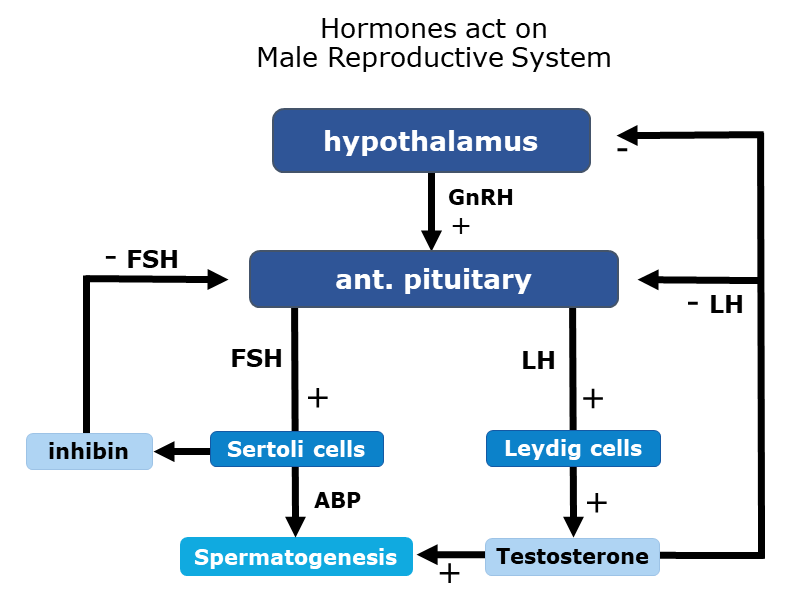Male Endocrinology
Hormonal Regulation in the Male Reproduction
Hormonal regulation of the male body is largely connected to the endocrine glands located in the brain and Hypothalamic-Pituitary axis. The hypothalamus initiates the synthesis and secretion of Gonadotropin Releasing Hormone (GnRH). GnRH stimulates the anterior pituitary and causes the secretion of Follicle Stimulating Hormone (FSH) and Luteinizing Hormone (LH). FSH and LH hormones circulate in the bloodstream and act at the testes to produce testosterone and stimulate the process of spermatogenesis.
LH positively affects the Leydig cells located within the interstitial spaces between the seminiferous tubules and stimulates the cells to produce testosterone. FSH acts at Sertoli cells located within the seminiferous tubules and stimulates the process of spermatogenesis. FSH does this by stimulating Sertoli cells to produce antigen binding protein (ABP), which leads to testosterone hormone uptake, increases its concentration within the seminiferous tubules, and initiating the production of sperms by the spermatogenic cells inside the tubules.

The Effect of Testosterone
Testosterone also enters circulation and transport around the whole body, targeting many cells and organs. Once reaching skeletal muscle, testosterone increases protein synthesis and increases muscle growth. Testosterone also travels to the brain, where it boosts sexual desire and stimulates the synthesis and release of Growth Hormone (GH), supporting bone growth.
The surge in testosterone during adolescence explains why males often attain greater height than females. Along with making a taller, stronger body, testosterone plays a pivotal role in the initiation and maintenance of secondary sexual characteristics in males during puberty.
Lastly, testosterone influences male fetal development. It impacts Wolffian duct development and aids in the development of male reproduction structures during embryogenesis.
Negative Regulation of Spermatogenesis
While testosterone has many initiative properties, its excess contributes to a negative feedback effect of the hypothalamus and anterior pituitary. The excess of testosterone causes a decrease in its synthesis and secretion either directly by suppressing pituitary gland production of LH, or indirectly by participating in negative feedback on GnRH at the hypothalamus higher center.
Another hormone produced by Sertoli cells is inhibin. As Sertoli cells increase the production of inhibin hormone, it is not surprising that inhibin decreases the synthesis of sperms and inhibits spermatogenesis by suppressing the pituitary gland and inhibiting of FSH production.
Clinical Correlation
Some athletes use anabolic steroids to increase muscle mass and get stronger. These steroids act like natural male testosterone and could affect male reproductive organs and sperm production, as they cause hormonal imbalance and may suppress spermatogenesis by the negative hormonal effect at the higher center of the brain, hypothalamus, and pituitary glands.
Take Home Message
- Testosterone is the primary male sex hormone. It is produced by Leydig cells in testes.
- Testosterone has a negative hormonal action at the hypothalamus and pituitary gland.

